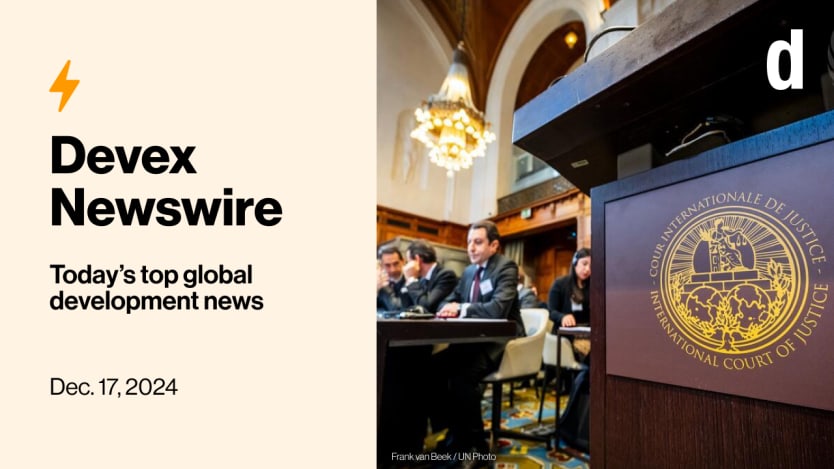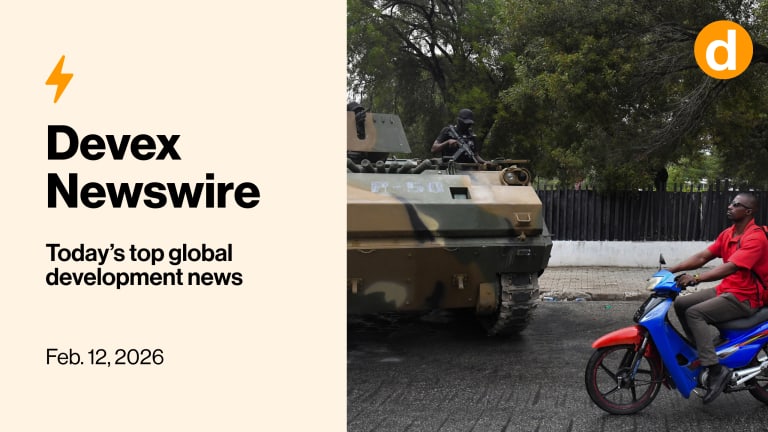Presented by data.org

It’s that time of year — looking back at what happened in 2024 and looking forward to what could happen in 2025. We talk to three experts in development for their reflections and preparations.
Also in today’s edition: It’s a new dawn for the Millennium Challenge Corporation.
The year ahead
This is a preview of Newswire
Sign up to this newsletter for an inside look at the biggest stories in global development, in your inbox daily.
It ain’t easy being an aid advocate these days: Spending cuts seemingly around every corner. Nationalist political headwinds. A pileup of crises, from climate change to conflict to debt overload.
So for the latest Devex Pro Leader Roundtable, we talked to Ndidi Okonkwo Nwuneli, CEO of the ONE Campaign; Sean Callahan, president of Catholic Relief Services; and Hans Peter Lankes, managing director of ODI Global, about the forces that shaped global development in 2024 and how their organizations are girding for 2025.
And “girding” is an apt description. Many in the development community are doing just that as they anxiously await a second Donald Trump presidency — and the aid cuts his administration is likely to usher in. However, downsizing is also happening across the Atlantic, as European populism chips away at domestic support for helping others abroad.
Lankes pointed to an overall trend toward “an interest-driven approach” among donors. “[It’s] the ‘my country first’ approach that we’re seeing not just in America” but also in the United Kingdom, Germany, the Netherlands, and elsewhere, he said. “What we [as global development advocates] have to do is convert this into a mutual interest approach, where we identify … that international engagement in various forms is something that produces mutual benefits.”
With government donor largesse drying up, finding other sources of funding will also be key.
Lankes said the questions many in the sector have been grappling with include: “How can we bring in other sources of financing? How can we bring in the private sector, how can we … leverage the international financial institutions more than we have? All those issues have been on the table and there’s a growing momentum behind them.”
On the bright side, there’s also growing momentum in the quixotic journey toward localization.
Callahan said the recognition of localization’s importance is there. “And I think those of us who are committed to the agenda see it not only as the right thing to do but also the smart thing to do.”
Read: The trends that shaped global development in 2024 (Pro)
+ Not a Devex Pro member yet? Start your 15-day free trial today to access all our expert analyses, insider insights, funding data, events, and more. Check out all the exclusive content available to you.
Birthday wishes do come true
Some potential good news for the Millennium Challenge Corporation for 2025: It not only celebrated its 20th anniversary this year, but it’s poised to get its birthday wish by year’s end, my colleague Adva Saldinger writes.
The U.S. Congress is on the verge of approving a bill that would expand the range of countries eligible to receive MCC’s large grants, which aim to promote economic growth in nations with strong records of good governance.
MCC currently works with low-income or lower-middle-income countries. However, the proposed legislation would extend eligibility to all countries that qualify for lending from the World Bank’s International Bank for Reconstruction and Development, which supports middle-income nations.
The new law would enable 33 additional countries to meet MCC’s financial eligibility criteria — including countries in Eastern Europe, such as Moldova, where MCC previously worked but which has since graduated out of eligibility.
The impetus for the bill was not only the shrinking pool of countries eligible for MCC coveted grants but also a desire to make U.S. aid more effective and better aligned with modern times, says a staffer for Rep. Joaquin Castro, a Democrat from Texas who introduced the bill. That required accounting for income inequality, regional disparities, and countries that might be nominally wealthier but still require assistance, the staffer says.
“From climate resilience to immigration management, I’m looking forward to the expanded impact this will allow U.S. development aid to have on the most important issues of our time,” Castro said in a statement.
Read: MCC bill nears approval, expanding country eligibility and oversight
+ Read our series of articles examining the Millennium Challenge Corporation as it marks its 20th year.
Just in case
After the disappointment many climate advocates and global south nations felt at the deal made at the COP29 U.N. climate summit, they’re turning to a new avenue for change: A legal case. Over the first two weeks of December, almost 100 countries and 12 international organizations appeared before the International Court of Justice, with climate-vulnerable nations — led by Vanuatu — seeking to clarify the duties that high-emitting countries have to fight climate change.
It’s the largest case the U.N. has ever seen, my colleague Jesse Chase-Lubitz writes.
Of course, not everyone is on the same page. India and the U.S. were among the nations that publicly argued against more obligations for wealthy polluting countries. A decision is expected next month from the court — and though it will be nonbinding, advocates hope it will at least be considered to have moral weight.
“We’re not getting anywhere in the negotiations,” says St. Lucia delegation leader Jan Yves Remy. “What do we have to lose?”
Read: Nations turn to ICJ for clarity on climate accountability
Haiti watch
Haiti needs all the help it can get. Along with entrenched poverty, chronic political upheaval, and climate disasters, the capital of Port-au-Prince has been overrun by violent gangs, shattering any semblance of normal life.
As a result, the need for assistance has surged. So we identified the top global development employers hiring in Haiti, according to data from the Devex job board for the past 12 months.
The largest employers are U.N. organizations, such as the U.N. Office for the Coordination of Humanitarian Affairs and the U.N. Office on Drugs and Crime. While there are fewer employment opportunities from bilateral agencies, several international development companies and international NGOs are working in Haiti to implement programs, particularly those funded by USAID.
Read: The top global development employers in Haiti (Career)
+ Start your 15-day free trial of a Devex Career Account membership today to unlock all our exclusive career resources and get full access to the world’s largest global development job board.
Global voices
“As we work to advance dignity and opportunity around the world, we see again and again that local leadership is critical for transformative and sustained impact.”
— Samantha Power, administrator, USAIDIn Devex Global Voices 2024, we have gathered predictions for the year ahead in the fields of artificial intelligence, localization, climate, and more, as well as some of our most-read opinion pieces this year.
Today we’re featuring some of our most-read op-eds on localization:
• How USAID is working to hit its localization targets by Samantha Power.
• Dear INGOs, localization needs local leaders, not boxes ticked by Rita Panicker and Amanda Griffith.
• There is opportunity in the rise of national aid organizations by Alexander Matheou.
Read on for more of the most insightful global development professionals’ op-eds of 2024.
In other news
The military junta in Myanmar kept researchers from gathering data and aid workers from publishing reports to hide a severe food crisis in the country. [Reuters]
Cyclone Chido has left devastation in its wake with several hundred feared dead in the French island territory of Mayotte and millions also affected in Comoros, Madagascar, and Mozambique. [AP]
Malaria cases have risen again for the fifth consecutive year, according to the World Health Organization. [The Guardian]
Sign up to Newswire for an inside look at the biggest stories in global development.








